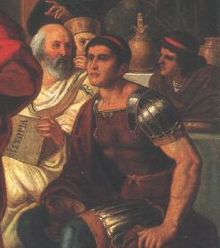447
Appearance
| Millennium: | 1st millennium |
|---|---|
| Centuries: | |
| Decades: | |
| Years: |
| 447 by topic |
|---|
| Leaders |
| Categories |
| Gregorian calendar | 447 CDXLVII |
| Ab urbe condita | 1200 |
| Assyrian calendar | 5197 |
| Balinese saka calendar | 368–369 |
| Bengali calendar | −146 |
| Berber calendar | 1397 |
| Buddhist calendar | 991 |
| Burmese calendar | −191 |
| Byzantine calendar | 5955–5956 |
| Chinese calendar | 丙戌年 (Fire Dog) 3144 or 2937 — to — 丁亥年 (Fire Pig) 3145 or 2938 |
| Coptic calendar | 163–164 |
| Discordian calendar | 1613 |
| Ethiopian calendar | 439–440 |
| Hebrew calendar | 4207–4208 |
| Hindu calendars | |
| - Vikram Samvat | 503–504 |
| - Shaka Samvat | 368–369 |
| - Kali Yuga | 3547–3548 |
| Holocene calendar | 10447 |
| Iranian calendar | 175 BP – 174 BP |
| Islamic calendar | 180 BH – 179 BH |
| Javanese calendar | 331–333 |
| Julian calendar | 447 CDXLVII |
| Korean calendar | 2780 |
| Minguo calendar | 1465 before ROC 民前1465年 |
| Nanakshahi calendar | −1021 |
| Seleucid era | 758/759 AG |
| Thai solar calendar | 989–990 |
| Tibetan calendar | 阳火狗年 (male Fire-Dog) 573 or 192 or −580 — to — 阴火猪年 (female Fire-Pig) 574 or 193 or −579 |

Year 447 (CDXLVII) was a common year starting on Wednesday (link will display the full calendar) of the Julian calendar. At the time, it was known as the Year of the Consulship of Calepius and Ardabur (or, less frequently, year 1200 Ab urbe condita). The denomination 447 for this year has been used since the early medieval period, when the Anno Domini calendar era became the prevalent method in Europe for naming years.
Events
By place
Roman Empire
- November 6 – The Walls of Constantinople are severely damaged by an earthquake, destroying large parts of the wall, including 57 towers. The population is threatened by a plague. Emperor Theodosius II orders Constantine, praetorian prefect of the East, to supervise the repairs. He employs the city's demoi ("Circus factions") in the work and rebuilt the walls within 60 days.
- The Huns, led by Attila, cross the Danube and invade the Balkans as far as Thermopylae (Greece). During the invasion Serdica (modern Sofia) is destroyed. For disobeying the terms of the treaty made since 442, Attila triples his demand for tribute to 2,100 pounds (ca. 700 kg) of gold per year; and the ransom for each Roman prisoner to 12 solidi.
- Theodosius II sends an embassy to Attila; Priscus of Panium, envoy for the Eastern Roman Empire, records one of few eyewitness accounts of Hun kingdom.
- Battle of the Utus: Attila defeats the Roman army near the Vit River (Bulgaria). The Huns are forced to abandon the siege of Constantinople. They marched north and plunder the defenseless Balkan provinces (including Thrace, Scythia, Moesia, Dacia and Illyricum).
- Winter – Theodosius II chooses a policy to protect Constantinople against the Huns. He removes Aspar and Areobindus (magister militum) from their military commands.[1]
Britannia
- Vortigern, king of the Britons, receives the Saxon leaders Hengist and Horsa "as friends" and grants the brothers the Isle of Thanet, most easterly point of Kent (England).
Europe
- Merovech becomes king of the Salian Franks and founder of the Merovingian dynasty. He settles his Frankish tribe near the Dutch river Merwede, part of the Rhine–Meuse–Scheldt delta (Netherlands).[2]
By topic
Arts and Sciences
- The first entry in the Annales Cambriæ refers to this year.
Religion
- Second visit of Germanus, bishop of Auxerre, to Britain. He spiritually combat the revived Pelagian threat and expels the Irish from Powys (Wales).
- The Synod of Toledo (Spain) tries to add the filioque clause to the Nicene Creed. The Greek Orthodox Church refuses to go along with this idea.
Births
Deaths
- Areobindus, Roman general (magister militum)
- Juqu Mujian, prince of the Chinese state Northern Liang
- November 27 – Secundinus (or Seachnaill), patron saint
References
- ^ The End of Empire (p. 144). Christopher Kelly, 2009. ISBN 978-0-393-33849-2
- ^ Thiidrekssaga Research: Merovingian Origin Location (s)
